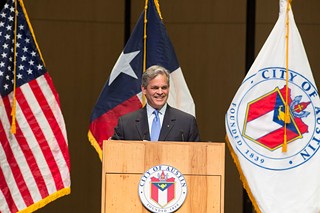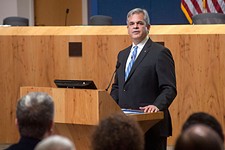Point Austin: Cutting and Spending
City Council flashing unsynchronized financial signals
By Michael King, Fri., April 17, 2015
In late March, city of Austin department heads received an email (subject: "Budget Reduction Menu") from Deputy Chief Financial Officer Ed Van Eenoo, with the following request: "Departments whose budgets directly impact the General Fund will need to develop a list of budget reductions totaling 5% of their FY16 Forecasted General Fund Budget." Van Eenoo noted that the request is pursuant to a previous City Council resolution, which directed City Manager Marc Ott to "provide the Council with a list of service reductions that could potentially be used to offset the revenue loss associated with implementing a General Homestead Tax Exemption." That would be the proposed 20% homestead exemption on property taxes, estimated last year to cost the city an annual $36.6 million.
In his State of the City address this week, Mayor Steve Adler recalled the resolution, thanking District 8 Council Member Ellen Troxclair for sponsoring it, and said he believed it could be done "in a way that minimizes impact to vital city services and infrastructure." Although not unanimously, the Council appears to be leaning toward implementing the homestead exemption (several, including the mayor, campaigned on it). While acknowledging it would favor the wealthiest homeowners, and favor homeowners over renters, supporters insist it's necessary to address "affordability" – as Adler put it, providing homeowners (or would-be homeowners) "a meaningful reduction in their property tax burden." As for renters (i.e., the majority of Austinites): the mayor hopes to restructure the utility drainage fee, and to fund more "energy efficiency upgrades."
I've argued elsewhere against the homestead exemption as inequitable ("Point Austin: Color Me Exempt," Nov. 21, 2014), but I won't revisit that argument here. I would simply note, first, that the exemption (based on last year's budget) would cost about 4% of the city's General Fund, so it's only prudent for city staff to start looking for about 5% in cuts to pay for it. It's also worth taking a look at whether the mayor and Council are as serious about those cuts as they expect the city staff to be.
Cut and Spend
In the past, Adler has suggested phasing in the exemption over time, although he didn't mention that aspect in his speech on Monday. But he did mention plenty of other things. He spent a lot of time on traffic congestion, trumpeting the city's "action plan" that fast-tracks certain road projects, focuses police efforts on bottlenecks like Downtown intersections ("Don't block the box!"), and adds staff for signal synchronization. And (to weary groans from the audience) he prioritized the reform of permitting and development review: "costs too much, takes too long, and makes everything more uncertain and housing more expensive."
There was plenty more grist in the speech, but those two priority items alone have one thing in common: They'll cost money. Adler insisted that most of the changes he's recommending (e.g., staggered work hours) should not be expensive, but there is no way to do what he's proposing on traffic and permitting without spending money on more cops and more staff – the same staff he and his Council colleagues have just asked to find at least $36 million in cuts to enable a homestead exemption.
The Council's contribution to that effort? In addition to the necessary structural costs of 10-1 (about $2.5 million), they recently voted to increase the mayor's staff, and their own, to the tune of $400,000 for the next five months (or annually, another million-plus) – a "change" that went unmentioned in the mayor's speech – before they've even received next year's budget projections.
Austerity for Thee ...
So I guess that 5% in cuts just doesn't apply to the Council. Defending the increase in Council staffing, District 6 Council Member Don Zimmerman – self-proclaimed as the toughest fiscal conservative on the dais – said he had no problem with the cost, because he plans to propose taking that amount or more out of the city manager's budget. During the campaign, he and Troxclair also signed the "Citizens for Tax Reform Now" (i.e., Tea Party) pledge not to raise property taxes above the effective rate – the rate that would raise the same revenue as the previous year (plus new construction), which never meets the city's rising costs.
These policies do have a local precedent. Gov. Rick Perry used to regularly begin the legislative session by proposing a budget that featured 5% or 10% in cuts across all departments, and directing the Legislature to find some way to accommodate those reductions. But previous Councils didn't see the need to cut the budget in advance of seeing the actual numbers, nor bump up their own budget while simultaneously directing all other departments to cut theirs.
For now, call it 10-1 growing pains. The mayor said we should judge the new Council by its major accomplishments, and it's simply too soon to make those calls. But it's already clear they don't need to be members of the Tea Party to find themselves operating by Tea Party principles.
Got something to say on the subject? Send a letter to the editor.













